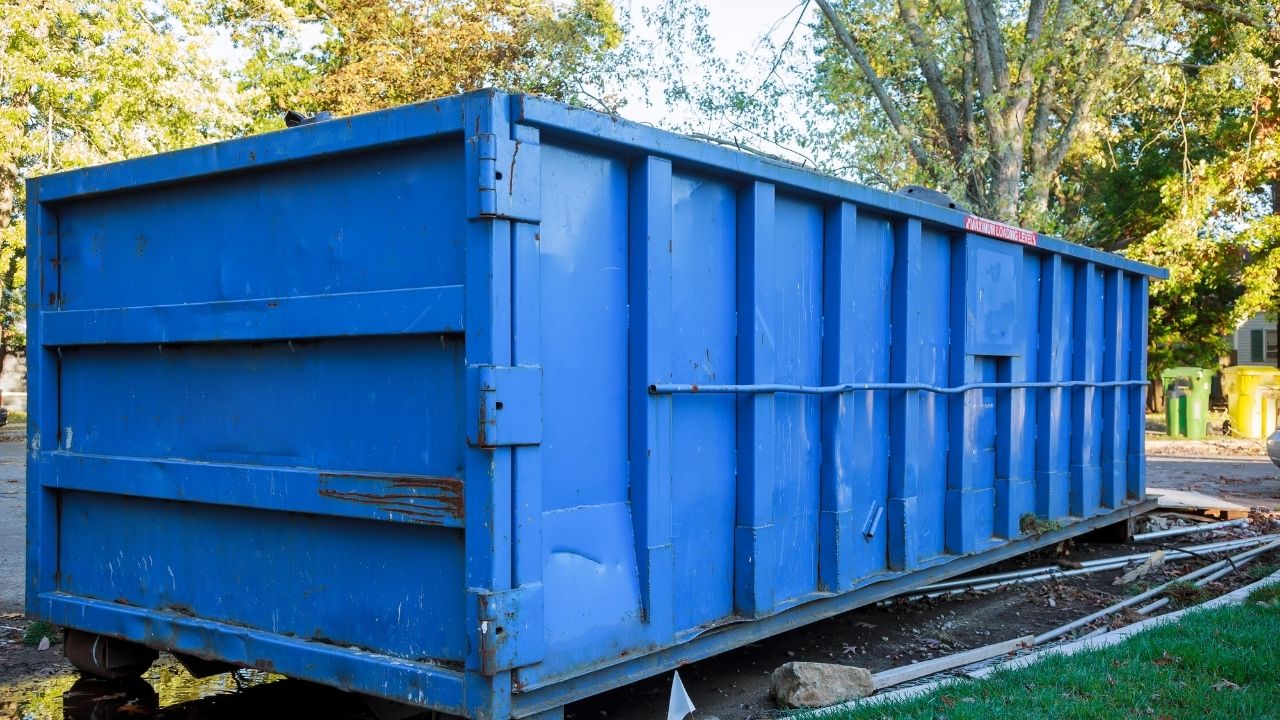Business
Everything You Need to Know Before Renting a Dumpster

Renting a dumpster can help you with a multitude of tasks, from renovation to decluttering in anticipation of a move. While it’s not hard to find a reliable dumpster rental company, there are some things you’ll need to know before renting a dumpster; for example, you’ll need to know the size of the dumpster you need and become familiar with regulations dictating what you can and can’t discard in them.
Fortunately, you can learn everything you need to know to rent a dumpster in a relatively short period of time.
Why Rent a Dumpster?
There are several good reasons to rent a dumpster, including:
- Renovation. Renovating a kitchen, bathroom, or other area of your house will likely leave you with old appliances and waste material.
- Landscaping. Landscaping work can churn up bushes, trees, and other plants that won’t go away on their own.
- Disaster cleanup. Fires, earthquakes, floods, and other natural disasters tend to leave a path of destruction, along with piles of debris, in their wake; dumpsters are perfect for cleanup.
- Moving. Dumpsters are ideal for clearing out old junk before moving.
- Decluttering. Even if you’re not moving, decluttering the house can help you feel better and take better advantage of your living space – and a dumpster can help you do it.
Size and Spec Considerations
One of the most important decisions you’ll make when renting a dumpster is determining what size to get (and what type of dumpster to get in general).
- Volume. Different types of dumpsters offer different sizes and loading capacities. For example, a standard 10 cubic yard dumpster is about 17×7.5×3.5 feet and it can hold about 4,000 to 6,000 pounds. At the other end of the spectrum, a 40 cubic yard dumpster is roughly 22×7.5×8 feet and it can hold upwards of 12,000 pounds. The bigger your project, the bigger the dumpster you’re going to need – and you shouldn’t risk overloading it.
- Materials. Some types of materials need a specific type of dumpster. For example, some dumpsters are designed for landscaping or for certain types of materials that don’t belong in a standard dumpster.
- Placement. Where are you going to place the dumpster? Dumpsters are often bigger than renters imagine; you’ll need to have a spot in mind before renting.
Appropriate and Responsible Disposal
Next, you’ll need to familiarize yourself with what you can and can’t throw into a dumpster. Generally speaking, you shouldn’t dispose of things in a dumpster that you wouldn’t throw in with regular trash. For example, you should never throw away old electronics, recycling them instead. You also shouldn’t throw away paint, gasoline, or other hazardous materials. Read a full guide on the subject before planning your dumpster rental.
Other Tips
Here are some other miscellaneous tips that can help you with your dumpster rental:
- Shop around. There are likely many different competing dumpster rental companies in your area. They may offer different prices, different sizes of dumpster, or different perks and additional services with rentals. Shop around before committing to your choice.
- Measure twice. Size is one of the most important considerations when renting a dumpster, so it’s something you need to be sure about. Measure all the big items you plan to get rid of (if you can) so you can come up with an accurate forecast of your volume needs. You’ll also want to measure an outline of the dumpster you’re considering so you can see if it will conveniently fit in the space you intend for it. You don’t want to be stuck with a dumpster that’s too big or too small.
- Do your prep work. It pays to do some prep work in advance. Prepare the area for the dumpster so you’re not scrambling at the last minute and try to go through some of your items before the dumpster arrives. The better you understand your project, the more efficiently it’s going to flow.
- Lift responsibly. It’s easy to hurt yourself when lifting heavy objects, especially if you don’t have much experience. Make sure you lift with your knees (rather than your back), use proper equipment, and don’t take on more than you can handle. While you’re at it, take frequent breaks.
- Get help. Finally, consider getting help. Whatever your project is, it’s going to be much easier and more manageable if you have more people participating in the process. Consider calling on roommates, friends, family members, and neighbors for some assistance – or hire a pro to do the job for you.
A dumpster can make your life considerably easier, and the rental process is a breeze if you know what you’re doing. After a bit of research and a bit of planning, you’ll be in a position to take full advantage of this additional asset.
Business
13 Reasons Investors Are Watching Phoenix Energy’s Expansion in the Williston Basin

As energy security becomes a growing priority in the United States, companies focused on domestic oil production are gaining attention from investors. One such company is Phoenix Energy, an independent oil and gas company operating in the Williston Basin, a prolific oil-producing region spanning North Dakota and Montana.
Phoenix Energy has established itself as a key player in this sector, expanding its footprint while offering structured investment opportunities to accredited investors. Through Regulation D 506(c) corporate bonds, the company provides investment options with annual interest rates ranging from 9% to 13%.
Here are 13 reasons why Phoenix Energy is attracting investor interest in 2025:
1. U.S. energy production remains a strategic priority
The global energy landscape is evolving, with a renewed focus on domestic oil and gas production to enhance economic stability and reduce reliance on foreign energy sources. The Williston Basin, home to the Bakken and Three Forks formations, continues to play a critical role in meeting these demands. Phoenix Energy has established an operational footprint in the basin, where it is actively investing in development and production.
2. Investment opportunities with fixed annual interest rates
Phoenix Energy bonds offer accredited investors annual interest rates between 9% and 13% through Regulation D 506(c). These bonds help fund the company’s expansion in the Williston Basin, where it acquires and develops oil and gas assets.
3. Record-breaking drilling speeds in the Williston Basin
Phoenix Energy has made significant strides in drilling efficiency, ranking among the fastest drillers in the Bakken Formation as of late 2024. By reducing drilling times, the company aims to optimize operations and improve overall production performance.
4. Expansion of operational footprint
Since becoming an operator in September 2023, Phoenix Energy has grown rapidly. As of March 2025, the company has 53 wells drilled and 96 wells planned over the next 12 months.
5. Surpassing production expectations
Phoenix Energy’s oil production has steadily increased. By mid-2024, its cumulative production had exceeded 1.57 million barrels, outpacing its total output for 2023. The company projected an exit rate of nearly 20,000 barrels of oil equivalent per day by the end of March 2025.
6. High-net-worth investor offerings
For investors seeking alternative investments with higher-yield opportunities, Phoenix Energy offers the Adamantium bonds through Reg D 506(c), which provides corporate bonds with annual interest rates between 13% and 16%, with investment terms ranging from 5 to 11 years, and a minimum investment of $2 million.
7. Experienced team with industry-specific expertise
Phoenix Energy’s leadership and technical teams include professionals with decades of oil and gas experience, including backgrounds in drilling engineering, land acquisition, and reservoir analysis. This level of in-house expertise supports the company’s ability to evaluate acreage, manage operations, and execute its long-term development plans in the Williston Basin.
8. Focus on investor communication and understanding
Phoenix Energy prioritizes clear investor communication. The company hosts webinars and provides access to licensed professionals who walk investors through the business model and operations in the oil and gas sector. These efforts aim to help investors better understand how Phoenix Energy deploys capital across mineral acquisitions and operated wells.
9. Managing market risk through strategic planning
The energy sector is cyclical, and Phoenix Energy takes a structured approach to risk management. The company employs hedging strategies and asset-backed financing to help mitigate potential fluctuations in the oil market.
10. Commitment to compliance
Phoenix Energy conducts its bond offerings under the SEC’s Regulation D Rule 506(c) exemption. These offerings are made available exclusively to accredited investors and are facilitated through a registered broker-dealer to support adherence to federal securities laws. Investors can review applicable offering filings on the SEC’s EDGAR database.
11. Recognition for business practices
As of April 2025, Phoenix Energy maintains an A+ rating with the Better Business Bureau (BBB) and is a BBB-accredited business. The company has also earned strong ratings on investor review platforms such as Trustpilot and Google Reviews, where investors often highlight clear communication and transparency.
12. A family-founded business with a long-term vision
Led by CEO Adam Ferrari, Phoenix Energy operates as a family-founded business with a focus on long-term investment strategies. The company’s leadership emphasizes responsible growth and sustainable development in the Williston Basin.
13. Positioned for long-term growth in the oil sector
With U.S. energy demand projected to remain strong, Phoenix Energy is strategically positioned for continued expansion. The company’s focus on efficient drilling, financial discipline, and structured investment offerings aligns with its goal of building a resilient and growth-oriented business.
Final thoughts
For investors looking to gain exposure to the U.S. oil and gas sector, Phoenix Energy presents an opportunity to participate in a structured alternative investment backed by the company’s operational expansion in the Williston Basin.
Accredited investors interested in learning more can attend one of Phoenix Energy’s investor webinars, which are hosted daily throughout the week. These sessions provide insights into market trends, risk management strategies, and investment opportunities.
For more information, visit the Phoenix Energy website.
Phoenix Capital Group Holdings, LLC is now Phoenix Energy One, LLC, doing business as Phoenix Energy. The testimonials on review sites may not be representative of other investors not listed on the sites. The testimonials are no guarantee of future performance or success of the Company or a return on investment. Alternative investments are speculative, illiquid, and you may lose some or all of your investment. Securities are offered by Dalmore Group member FINRA/SIPC. Dalmore Group and Phoenix Energy are not affiliated. See full disclosures.
This article contains forward-looking statements based on our current expectations, assumptions, and beliefs about future events and market conditions. These statements, identifiable by terms such as “anticipate,” “believe,” “intend,” “may,” “expect,” “plan,” “should,” and similar expressions, involve risks and uncertainties that could cause actual results to differ materially. Factors that may impact these outcomes include changes in market conditions, regulatory developments, operational performance, and other risks described in our filings with the U.S. Securities and Exchange Commission. Forward-looking statements are not guarantees of future performance, and Phoenix Energy undertakes no obligation to update them except as required by law.
-

 Tech4 years ago
Tech4 years agoEffuel Reviews (2021) – Effuel ECO OBD2 Saves Fuel, and Reduce Gas Cost? Effuel Customer Reviews
-

 Tech6 years ago
Tech6 years agoBosch Power Tools India Launches ‘Cordless Matlab Bosch’ Campaign to Demonstrate the Power of Cordless
-

 Lifestyle6 years ago
Lifestyle6 years agoCatholic Cases App brings Church’s Moral Teachings to Androids and iPhones
-

 Lifestyle4 years ago
Lifestyle4 years agoEast Side Hype x Billionaire Boys Club. Hottest New Streetwear Releases in Utah.
-

 Tech6 years ago
Tech6 years agoCloud Buyers & Investors to Profit in the Future
-

 Lifestyle5 years ago
Lifestyle5 years agoThe Midas of Cosmetic Dermatology: Dr. Simon Ourian
-

 Health6 years ago
Health6 years agoCBDistillery Review: Is it a scam?
-

 Entertainment6 years ago
Entertainment6 years agoAvengers Endgame now Available on 123Movies for Download & Streaming for Free
